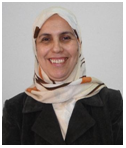Keynote Forum

Yumna Shehadeh
IsraelTitle: External Quality Assessment Scheme in Food Microbiology in Palestine
Abstract:
Microbiological testing of food is important for ensuring its quality and safety. Thus, it is a basic tools to assess the effectiveness of risk management programs for ensuring food safety and quality which necessitate the presence of Quality Assessment programs. Therefore, the Center for Quality in Medical Laboratories (CQML), Department of Medical Laboratory Sciences, Al Quds University, organized the external quality assessment schemes (EQA) in Water and Food Microbiology in support from the Food and Agriculture Organization (FAO), and Palestine Accreditation Unit (PALAC). The CQML is a Proficiency Testing (PT) provider in the Medical Laboratory field since 1995. The EQA scheme for food microbiology started in 2019. The EQA schemes is available to all food microbiology laboratories, providing schemes in water and drinks, meat and poultry, dairy products, fish and sea food, and salads. The participation is currently free of charge, but mandatory for accredited labs and voluntary for the others. Methods: There are 6 accredited food testing labs, and 2 labs belonging to food industry factories enrolled in the schemes. All the control materials used are prepared in house, offering freeze dried mixtures of organisms as simulated foods and water samples. The microorganisms used for spiking are American Type Culture Collection (ATCC) certified organisms. The control material are proven stable, homogeneous, prepared and tested by qualified microbiologists, interpretation of test results is presented in reports.
Biography:
Yumna Shehadeh is the Director, Center for Quality in Medical Laboratories she has published more than 25 papers in reputed journals and has been serving lecturer in Department of Medical Laboratory Sciences, Medical Laboratory Sciences, College of Health Professions, Al-Quds University, Abudis, Jerusalem -Palestine, Health Complex, level -1Yumna Shehadeh is the Director, Center for Quality in Medical Laboratories she has published more than 25 papers in reputed journals and has been serving lecturer in Department of Medical Laboratory Sciences, Medical Laboratory Sciences, College of Health Professions, Al-Quds University, Abudis, Jerusalem -Palestine, Health Complex, level -1
Speakers

Inam Qureshi
UAETitle: Food Safety During and After the Era of COVID-19 Pandemic
Abstract:
The coronavirus disease 2019 (COVID-19) is a clinical syndrome caused by severe acute respiratory syndrome corona virus-2 (SARS-CoV-2). COVID-19 was declared a pandemic by the World Health Organization (WHO) on March 11, 2020 due to its rapid and extensive spread among many countries through its very contagious nature and its high mortality among the elderly and infirm. Recently, data on the survival of SARS-CoV-2 on contact surfaces has been reported, but there is none on the survival of COVID-19 on food surfaces and packages. The potential survival and transmission of SARS-CoV-2 on/via food and packages are discussed based on data available for other respiratory viruses such as SARS-CoV and MERS-CoV. However, studies are needed to explore its transmission via food and survival on food packaging materials. The implementation of food safety management systems such as Hazard Analysis and Critical Control Points (HACCP), and Good Manufacturing Practices (GMP) are important to reduce the risk of COVID-19 infection. Cleaning, sanitation, good hygienic practices, and active packaging are also needed from farm to fork.
Biography:
INAM has completed his MASTER DEGREE at the age of 25 years from URDU University. He is the SR FOOS SAFETY CONSULTANT. He has published more than 25 papers in reputed journals and has been serving as an editorial board member of repute.

Dhon G Dungca
PhilippinesTitle: From Overproduction to Income Generation: Application of Food Technology and Production Line Balancing Techniques in producing Preserved Food Items from Excess/Unsold Produce
Abstract:
One of the challenges that crop growers face is the harvesting of produce in the Philippines at the right quantity at the right time. While their harvest is distributed for sale in different stores for retail, they still end up with numbers of unsold produce which may eventually spoil and turn into waste. In a province near Manila, a learning center entered into a venture/advocacy where unsold produce from a group of growers were processed and turned into preserved dried chips which were supplied to supermarkets and groceries. Through the assistance of the Department of Science and Technology (DOST) Set-Up, food-processing equipment were acquired which addressed the need for adopting technological innovations. Industrial Engineering consultants also came into the picture to assist in the streamlining of processes and increasing of efficiency and utilization through production line balancing: a technique to increase production and reduce idle time with minimal personnel. Training was also administered by the venture which was aimed to increase productivity, reduce variability, increase food safety awareness, and boost the morale of its manpower. As a result of these interventions, production capacity was set to a minimum of 10,000 packs per day which translates into a revenue amounting to PhP 1.2M (US$24,000) per day. With this venture, produce that are about to turn into waste can be turned into something that can generate additional income which eventually uplift the lives of the farmers despite of the COVID19 pandemic.

Dr. Itay Shafat
IsraelTitle: Brain reserve – a nutritional perspective
Abstract:
One of the most important macro trends affecting the national space is the global aging of the population. People from almost every nation, females and males, age at a rapid pace, Europe being in the forefront of the trend. As the population ages, concepts such as “healthy aging” (adding healthy, free from chronic ailments normally affecting the elderly, years to our longevity) and “successful aging” (a bit more subjective but generally describing having meaningful lives) are coming into discussion. One of the most important aspects of health or successful aging is one’s cognitive health. Cognitive capabilities tend to decline with age, either as part of the natural age process or due to pathology, a decline which may have significant effect on the quality of life of the affected individual.
Humans have not been very successful at treating cognitive decline. This is evident from the lack of successful pharmaceuticals aimed at treating ailments such as Alzheimer’s disease or dementia. As with many other ailments, prevention may be a better option than treatment. When considering the issue of cognitive decline, one prevention option is to increase one’s brain reserve. Brain reserve is a term that reflects certain properties of the brain that can prevent or reduce loss of cognitive function despite substantial loss of brain material that can happen as we age.
How to build one’s brain reserve? There are many factors to building one’s brain reserve, including leaving a healthy lifestyle, being socially active and more. Can certain foods or nutraceuticals help in building brain reserve and reduce risks of cognitive decline? We will discuss all these questions during the presentation, and will discuss what evidence exist, and what does not, in addressing the dire need of helping people, especially in the face of the aging population, to build their brain reserves.
Biography:
Dr. Itay Shafat has long experience in companies, small and global, developing clinically proven ingredients shown to cognitive function. Dr. Shafat holds his Ph.D. from the School of Medicine, Technion, Israel, and M.Sc. in Food Engineering and Biotechnology from the Technion, Israel. Dr. Shafat has extensive scientific background and has developed expertise in lipidomics and the impact of lipids on human health. Dr. Shafat is the author and co-author of several scientific papers and book chapters.

Dr. Chritopher Larbie
GhanaTitle: Hepatoprotective effects of aqueous and hydroethanolic stem bark extracts of Tetrapleura tetraptera (Schum. & Thonn.) Taub. in drug-induced toxicities in rats
Abstract:
Hepatotoxicity is an issue of global concern because of numerous liver-related deaths. In addition, conventional hepatoprotective and hepatocurative drugs are more expensive, uneasily accessible, and may have serious adverse effects. It is for these reasons that many people have resorted to traditional medicine. This study sought to evaluate the hepatoprotective effects of aqueous and hydroethanolic stem bark extracts of Tetrapleura tetraptera in paracetamol and carbon tetrachloride-induced hepatotoxicities in rats. Pulverized samples (500g each) were soaked in 1000 mL of boiled water and 50% hydroethanol respectively for 24 hours. Filtrates were extracted to obtain aqueous and hydroethanolic stem bark extracts, ASE, and HSE respectively. Extracts were evaluated for phytochemicals and free radical scavenging effects. Seventy-two male Wistar albino rats (120-180 g) were divided into eighteen groups with four in each group. Carbon tetrachloride (1.0 mL/kg b.wt; 1/1 v/v olive oil, intraperitoneal for 2 days) and Paracetamol (500 mg/kg b.wt p.o. daily for 7 days) were used to induce hepatotoxicity. The protective effects of extracts at 100 mg and 250 mg and silymarin (100 mg) were accessed. HSE had higher amounts of phytochemicals than ASE. The LD50 was above 5000 mg/kg b.wt. Hematological and biochemical analyses revealed HSE had a greater hepatoprotective effect against paracetamol and carbon tetrachloride compared to Silymarin. The liver antioxidant profile further confirmed ASE and HSE as hepatoprotective. These results indicate ASE and HSE of Tetrapleura tetraptera have hepatoprotective effects against paracetamol and carbon tetrachloride-induced hepatotoxicities in rats and could be developed as a potential liver protective agent.
Biography:
Dr. Christopher Larbie is a Senior Lecturer at the Department of Biochemistry and Biotechnology, Kwame Nkrumah University of Science and Technology (KNUST), and the Coordinator for Graduate Programmes in Biochemistry and Biotechnology at the Department. He holds a BSc and Ph.D. in Biochemistry focusing on pharmacological and toxicological evaluation of medicinal plants for managing drug-induced liver injury from the KNUST. His research interests further include the development of animal models for diabesity (coexistence of diabetes and obesity), site-specific cancers, and clinical evaluation of characterized medicinal products for human diseases. Experimental techniques employed include phytochemical screening for natural products, hematological and biochemical assessment, and histological and immunohistochemical assessment of pro- and anti-inflammatory cytokines.
Poster

Fahim A. Shaltout
EgyptTitle: Influence of Plant Extracts on acceptability of Chilled Poultry Meat
Abstract:
Poultry meat is usually marketed at refrigerated temperatures (1 to 4 ◦C). Acceptability, Quality and Safety of refrigerated Poultry meat is the main concern for consumers and retailers. Poultry meat is contaminated from different sources as during slaughtering, during different manufacturing processes and during storage causing undesirable changes, microbial growth, spoilage and economic losses. Thus, the present study aimed to assess the effects of plant extracts (1.0 % Laurel, 1.0 % Moring and 1.0 % Olive leaf extract) on acceptability of raw Poultry breast meat stored at 1 to 4 ◦C for 16.0 days. The Data revealed that samples treated with 1.0 % laurel, 1.0 % Moringa and 1.0 % Olive extracts maintained the acceptability until 16th, 1±th, 12thdays of chilling at 1 to 4 ˚C, respectively. Compared to untreated one which got spoiled by 6th day of chilling at 1 to 4 ˚C. Samples treated with plant extracts revealed significant decrease in their keeping quality tests and marked decrease in bacterial examination (total bacterial, total coliform, total Staphylococci ) revealed that plant extracts have good antioxidant and antibacterial effects. Best effect was obtained in samples treated with 1.0 % laurel extract followed by samples treated with 1.0 % Moringa and those treated with 1.0 % olive leaf extract.
Biography:
Education Background: February 1996: ph.D. of Meat Hygiene Faculty of Veterinary Medicine, Moshtoho
Skills: Food Cost Analysis, Food Safety, Food Technology, Foodborne diseases, Food Microbiology, Food journal reviewer,Food Analysis

